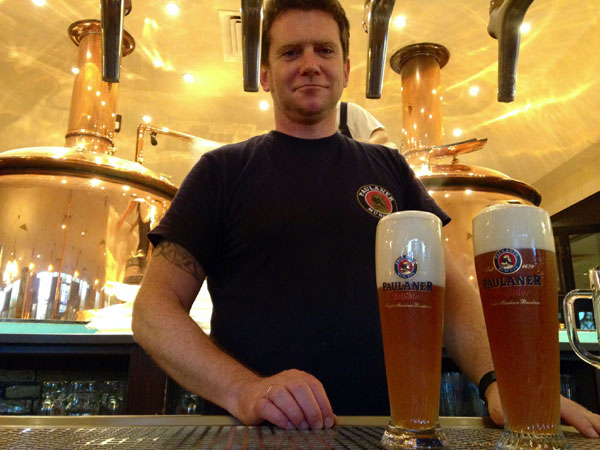

 |
|
Wolfgang Sesser. [Photos by Mike Peters/China Daily] |
The master brewer has lived in Asia for a decade already. He left South Korea after staying there for three years for stints at HB Munich in Shanghai before moving to Nanjing for another three years to brew beer for Kempinski both in the old southern capital and in nearby Wuxi city.
Sesser has learned to adjust the way he makes beer as he's moved north in China.
"In Nanjing, 70 percent of the beer we make is dark beer," he says. "It has a novelty appeal for Chinese drinkers, I think they coming looking for something special, something different, and dark beer has a stronger, more robust character."
In Beijing, however, the ratio is reversed.
"Here, 75 percent of what we sell is lager, light beer. I think that's perhaps because when the Kempinski opened in the capital 22 years ago, the light beer was promoted as original Munich beer, and it was a closer fit for Chinese tastes."
Another difference: In Jiangsu province, the beer is made sweeter and is lesser fermented. The ingredients don't change. The brewers simply allow less of the natural sugar to convert to alcohol, he says.
"If I served that beer here," he jokes, "people would ask why I'm giving them lemonade!"
A local taste concession his team of brewers never makes: No rice is added to the recipe, unlike in Asian beers such as Tsingtao and Asahi.
"We adhere to the old German law of purity," he says, "which means beer can only contain malt, hops, yeast and water".
It's not an issue. Sesser says: "Our customers are coming here to drink authentic German beer, whether they are foreigners (who dominate the lunchtime crowd) or Chinese (the majority at dinnertime)."
Using different kinds of malts, including some roasted varieties, and varying the cooking and fermenting procedures give brewers like Sesser plenty of creative latitude to produce a pleasing selection of beers, including the seasonal Oktoberfest.
The very word makes him smile.